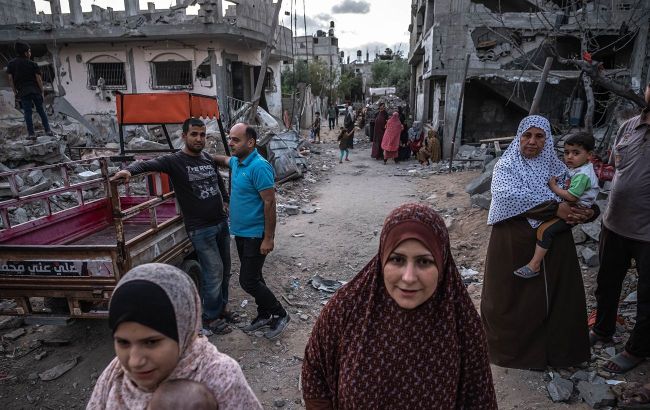Israel seeks to control security in Gaza Strip after war
 Israel refuses to transfer control of Gaza to Palestinians (photo: Getty Images)
Israel refuses to transfer control of Gaza to Palestinians (photo: Getty Images)
Despite calls from the United States, Israel will insist on maintaining security control over the West Bank of the Jordan River and in the Gaza Strip in the future after the war. Israel will not agree to the rule of the Palestinian Authority, states Israeli Prime Minister Benjamin Netanyahu.
"This is a mandatory condition, and it contradicts the idea of sovereignty. Every piece of territory we leave becomes a place from which to launch terrible terrorism against us," said Netanyahu to journalists during a briefing on Thursday, January 18.
The Prime Minister informed the United States of his position and, according to him, slowed down attempts to impose a reality on Israel that would only harm the country.
"A prime minister of Israel must be able to say no — also to the closest of friends," added Netanyahu.
He also stated that Tel Aviv would recognize the civilian authority in Gaza that does not preach or teach the destruction of the state of Israel and does not send terrorists to Israel. Netanyahu said, "I would be happy if we could find residents of Gaza who would do that," hinting that he would not accept the Palestinian administration.
Meanwhile, Palestinian Prime Minister Mohammed Shtayyeh, in an interview with Bloomberg News, stated that the Palestinian administration is working with U.S. officials on a plan to govern Gaza after the war.
Contradictions between Israel and the U.S. regarding the future of the Gaza Strip
In early January, U.S. Secretary of State Antony Blinken and other American officials stated that a lasting peace is impossible without the creation of a state for the Palestinians.
"Israel must stop taking steps that undercut Palestinians’ ability to govern themselves effectively," said Blinken during his visit to Tel Aviv.
Department of State spokesperson Matthew Miller told journalists that Israel cannot address its long-term issues without the establishment of a Palestinian state.
"There is a historic opportunity that Israel has to deal with challenges that it has faced since its founding, and we hope the country will take that opportunity," he said.
Israel's war with the Palestinian group Hamas
During the attack on Israel on October 7, Hamas militants reportedly killed 1,200 civilians and soldiers and abducted around 250 individuals. Subsequently, through a hostage exchange, terrorists released approximately 120 hostages, while Israel freed a group of Palestinian prisoners.
According to the Ministry of Health, under Hamas control, around 24,000 civilians have lost their lives as a result of Israel's military operation in the Gaza Strip.
Israeli Prime Minister Benjamin Netanyahu outlined three conditions for ending the war against Palestinian Hamas militants in the Gaza Strip.
On January 13, Tel Aviv informed Cairo of its plans to initiate a military operation to establish control over the border between the Gaza Strip and Egypt. However, Egypt rejected Israel's proposal for joint patrols with Israeli forces on the Egyptian side of the border.
U.S. Secretary of State Anthony Blinken called on Israel to cease causing additional harm to the civilian population in the Gaza Strip.

